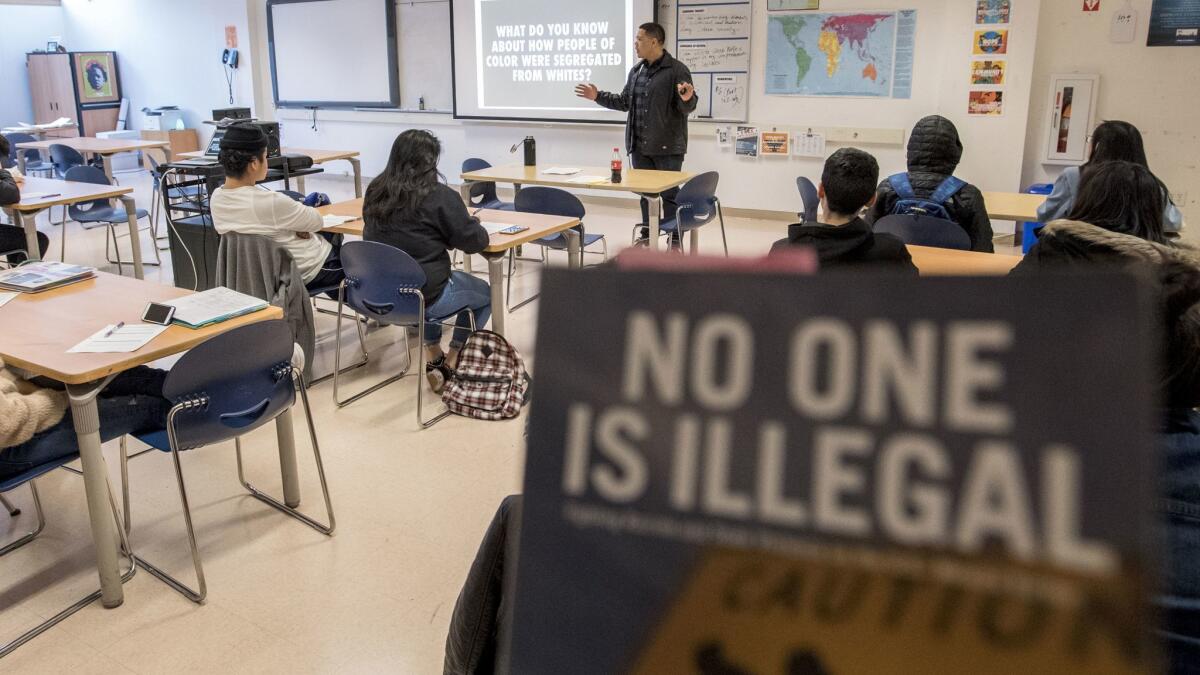Letters to the Editor: Ethnic studies is vital. California must get the curriculum right

- Share via
To the editor: California is in the process of developing an ethnic studies model curriculum in response to a 2016 state law that requires providing a guide to high schools interested in offering such courses. (“California’s proposed new ethnic studies curriculum is jargon-filled and all-too-PC,” editorial, Aug. 4)
The recently posted draft, written by an advisory committee to the Instructional Quality Commission, will be reviewed and substantially revised several times before it makes its way to the State Board of Education next year. Californians have submitted hundreds of comments, which the IQC will consider in September.
A revised draft will then be posted for a second comment period and potentially more revisions. In addition, the State Board of Education may request further edits in 2020 when it finally reviews the document.
Research shows that thoughtful courses in ethnic studies can help students think more deeply about history and society and feel more connected to school, improving graduation rates. California is committed to getting this work right. We will not accept a curriculum that fails to address difficult issues or does not promote open-mindedness and independent thought.
Linda Darling-Hammond, Palo Alto
The writer, a professor emeritus of education at Stanford University, is president of the California State Board of Education.
..
To the editor: From the late 1960s to the mid ‘80s, many local public schools had ethnic studies before it was forced out of the curriculum.
My Chicano students took my U.S. history classes, but they also took my Mexican American and Latin American history courses. They did this so they could learn their own history and the contributions their ancestors made not only to American history but also world history.
Their U.S. history books did not talk about the Toltecs, Olmecs, Mayans, Aztecs, the war that made them Chicanos, the Community Service Organization, Mendez vs. Westminster, Cesar Chavez or the American G.I. Forum. No one taught them of the struggles of their parents and grandparents. A whole generation had to wait until it got to college to learn what students did.
Just bring ethnic studies back and worry about the little stuff later.
John Perez, North Hollywood
..
To the editor: The L.A. Times Editorial Board is so correct that the state’s new ethnic studies model curriculum will have little effectiveness if students are not challenged to read, question, listen, gather facts and think critically about controversial issues.
And, of course, the understanding that teachers must have of complicated cultures and histories is not easy to communicate to high school students.
Furthermore, the draft curriculum’s assertion that the Boycott, Divestment and Sanctions operation is a social movement and not anti-Israel activism is wrong. This is a complicated issue, and we need to let our lawmakers know that the curriculum’s characterization of BDS is not acceptable.
Marcia Jacobs, Culver City
..
To the editor: While members of the editorial board might have trouble wrapping their minds around terms like “cisheteropatriarchy” and “womxn,” I promise you that thanks to Twitter and Teen Vogue, your average American teenager has encountered them and would welcome the opportunity to delve deeper than 280 characters, which makes them more qualified to comment on the value of this curriculum than the board of a nationally recognized newspaper.
The editorial lists a selection of historical and contemporary movements led by people of color and then asks about “studying a range of ideas. Who is left out in a range that spans the Black Panthers and BDS? Should students be forced to study the ideologies of segregationists and white nationalists to meet your criteria of balance?
Please, for your readers, articulate what is the “range of ideas” that offers an acceptable counterpoint to the idea that black lives have value.
Instead of concern-trolling, your board’s time would be better spent actually learning about the issues.
Maya Mackrandilal, Los Angeles
More to Read
A cure for the common opinion
Get thought-provoking perspectives with our weekly newsletter.
You may occasionally receive promotional content from the Los Angeles Times.









